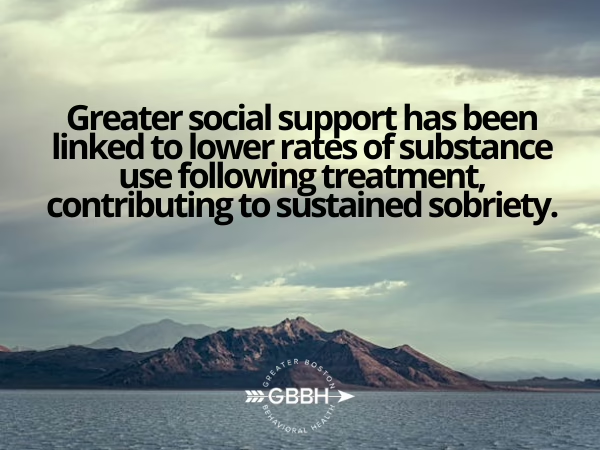The journey to recovery from addiction is often likened to a marathon—long, challenging, and requiring unwavering determination. While individual willpower is essential, it’s equally crucial to build a strong support system that fosters accountability. Accountability acts as a compass, guiding you through the complexities of recovery, preventing you from veering off course, and ultimately leading you towards lasting sobriety.
At Greater Boston Behavioral Health, we understand the importance of accountability in recovery. Through our Mental Health Treatment Programs, DBT Therapy, CBT Therapy, and other evidence-based approaches, we help individuals stay on track while building a strong foundation for lasting wellness. In this blog, we’ll explore the role of accountability in recovery, the benefits of having a support system, and how to integrate accountability into your journey.
Understanding Accountability
Accountability means taking responsibility for your actions and choices, even when it’s difficult or uncomfortable. It involves being honest about your struggles, setting clear goals, and making consistent efforts to achieve them. In the context of addiction recovery, accountability helps you stay on track, avoid relapse, and build a solid foundation for long-term sobriety.
Accountability isn’t about perfection; rather, it’s about having a structured support system to help you navigate the challenges of recovery. This could include:
- Regular check-ins with a therapist or counselor
- Support from family and friends
- Participation in group therapy or 12-step programs
- Setting and tracking personal goals
- Using mindfulness and self-reflection techniques
The Role of Support Systems
A robust support system is the bedrock upon which accountability thrives. It provides the encouragement, motivation, and structure needed to navigate the challenges of recovery. Here’s how different types of support contribute to your journey:
Family and friends
Their unwavering love, support, and understanding can be a powerful source of strength. They can offer practical assistance, emotional support, and a sense of belonging.
Support groups
Connecting with others who share similar experiences creates a sense of community and shared understanding. Sharing your struggles and victories can be incredibly validating and motivating.
Therapists and counselors
Professionals provide guidance, support, and accountability through therapy sessions. They offer tools and strategies to cope with challenges and develop healthy coping mechanisms.
Mentors and sponsors
Having a mentor who has successfully navigated recovery can be invaluable. They can offer guidance, share their experiences, and provide accountability.
Benefits of Having Support in Recovery
A strong support system offers numerous benefits:
Increased motivation
Knowing that others believe in you and are rooting for your success can boost your motivation to stay on track.
Enhanced accountability
Having people who check in on you and hold you responsible for your actions increases your chances of success.
Improved coping skills
Support systems can teach you healthy coping mechanisms for dealing with triggers and cravings.
Reduced isolation
Feeling connected to others can alleviate feelings of loneliness and isolation, common during recovery.
Increased self-esteem
Knowing that you have people who care about you and support your journey can boost your self-confidence and self-worth.
Building a Strong Support Network
Creating a strong support network takes time and effort. Here are some tips to help you build yours:
Be open and honest about your needs
Communicate your desire for support to your loved ones and let them know how they can help.
Seek out support groups
Attend meetings regularly and actively participate in group discussions.
Consider individual therapy
A therapist can provide personalized support and guidance.
Build relationships with other people in recovery
Connect with others who understand your journey and can offer support.
Strategies to Strengthen Accountability in Recovery
1. Set Clear, Achievable Goals
Setting realistic goals ensures accountability without overwhelming yourself. Goals should be specific and measurable, such as:
✅ “Attend three group therapy sessions per week”
✅ “Practice mindfulness for 10 minutes daily”
✅ “Limit social media usage to 30 minutes per day to reduce anxiety”
2. Use Accountability Partners
Whether it’s a therapist, sponsor, or trusted friend, having someone to check in with regularly can make a huge difference in staying accountable.
3. Engage in a Structured Program
Participating in structured Mental Health Therapy Programs or Intensive Outpatient Programs (IOP) ensures continuous progress under professional guidance.
4. Develop Self-Reflection Practices
Journaling, meditation, and CBT Therapy techniques help individuals track emotional changes and recognize potential relapse triggers.
Example:
A person overcoming substance use may journal about their triggers and how they managed them using coping techniques learned in therapy.
Overcoming Challenges in Seeking Support
It’s natural to feel hesitant or embarrassed about seeking support. However, remember that reaching out is a sign of strength, not weakness. To overcome these challenges:
- Start small: Begin by sharing your feelings with one trusted person.
- Challenge negative thoughts: Replace self-doubt with self-compassion.
- Focus on the benefits: Remind yourself of the positive impact a support system can have on your recovery.
The Role of Greater Boston Behavioral Health in Your Recovery
At Greater Boston Behavioral Health, we believe that accountability is key to successful recovery. Our Mental Health Treatment Center in Boston offers comprehensive programs tailored to each individual’s needs, ensuring a structured path to long-term well-being. Through individual therapy, group support, and structured mental health programs, we help clients build self-discipline, manage stress, and maintain motivation for lifelong success.
Find Support with Greater Boston Behavioral Health Group Therapy
At Greater Boston Behavioral Health, we understand the importance of accountability in recovery. Our comprehensive mental health programs are designed to foster a supportive environment where individuals can thrive. We offer a range of services, including:
- Mental Health Therapy Services
- Cognitive-behavioral therapy (CBT)
- Dialectical behavior therapy (DBT)
- Family Therapy Program
- Group Therapy Program
Our team of experienced professionals is dedicated to helping you build a strong support network and achieve long-term recovery. Call us at (888)278-0716 or Contact us today to learn more about our programs and how we can support you on your journey.
Frequently Asked Questions About Accountability in Recovery
What is accountability in recovery?
Accountability in recovery means taking responsibility for your actions and choices, setting goals, and making consistent efforts to achieve them. It involves being honest about your struggles and seeking support when needed.
Why is accountability important in recovery?
Accountability is crucial for maintaining sobriety and achieving long-term recovery goals. It provides structure, support, and motivation, helping individuals stay on track and make positive choices.
How can I build accountability into my recovery plan?
You can build accountability by setting specific goals, tracking your progress, finding a recovery sponsor or mentor, attending support groups, and being open and honest with your support system.
What if I struggle with being accountable?
It’s common to face challenges with accountability. Seeking support from a therapist or counselor can help you develop strategies to overcome these challenges.
How can accountability help prevent relapse?
Accountability provides a safety net by offering support, guidance, and encouragement. It helps you identify potential triggers and develop healthy coping mechanisms.
What role does Greater Boston Behavioral Health play in fostering accountability?
Greater Boston Behavioral Health offers various mental health programs and services designed to promote accountability in recovery, including individual therapy, group therapy, and support groups. Our team of professionals can help you develop personalized strategies to stay on track and achieve your goals.


